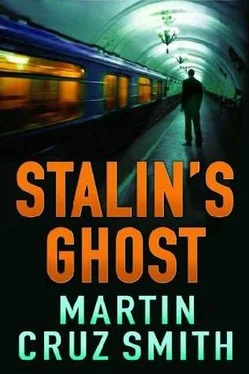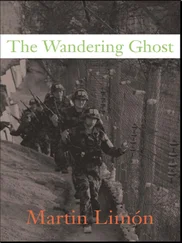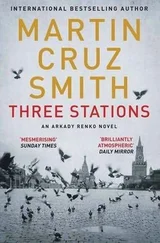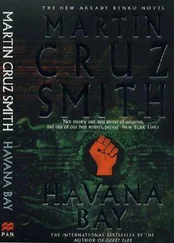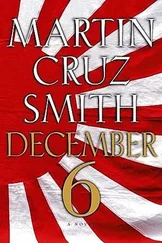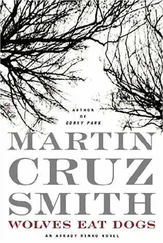Martin Smith - Stalin’s Ghost
Здесь есть возможность читать онлайн «Martin Smith - Stalin’s Ghost» весь текст электронной книги совершенно бесплатно (целиком полную версию без сокращений). В некоторых случаях можно слушать аудио, скачать через торрент в формате fb2 и присутствует краткое содержание. Жанр: Триллер, на английском языке. Описание произведения, (предисловие) а так же отзывы посетителей доступны на портале библиотеки ЛибКат.
- Название:Stalin’s Ghost
- Автор:
- Жанр:
- Год:неизвестен
- ISBN:нет данных
- Рейтинг книги:4 / 5. Голосов: 1
-
Избранное:Добавить в избранное
- Отзывы:
-
Ваша оценка:
- 80
- 1
- 2
- 3
- 4
- 5
Stalin’s Ghost: краткое содержание, описание и аннотация
Предлагаем к чтению аннотацию, описание, краткое содержание или предисловие (зависит от того, что написал сам автор книги «Stalin’s Ghost»). Если вы не нашли необходимую информацию о книге — напишите в комментариях, мы постараемся отыскать её.
Stalin’s Ghost — читать онлайн бесплатно полную книгу (весь текст) целиком
Ниже представлен текст книги, разбитый по страницам. Система сохранения места последней прочитанной страницы, позволяет с удобством читать онлайн бесплатно книгу «Stalin’s Ghost», без необходимости каждый раз заново искать на чём Вы остановились. Поставьте закладку, и сможете в любой момент перейти на страницу, на которой закончили чтение.
Интервал:
Закладка:
Rudi said, “You don’t have to take the legs off to get boots.”
“You do if they’re frozen. You have to warm up the boots at a campfire. Since you don’t want to drag a body around the camp, you saw off the lower legs and carry them. Especially if they’re leather boots made to order. So, I’d say he was a young, newly wed German officer who thought he would be home for Christmas. That’s just a guess.”
Rudi said, “What a shovelful of bullshit that is. From Moscow, too.”
“It probably is,” Arkady agreed. “Tip him over. Misha detected something.”
Rudi pulled on the rib cage. The earth gave reluctantly, but the skeleton rolled away from a metal spoon on a chain attached to the cervical vertebrae. On the chain was a black spoon with a swastika stamped on the handle. Rudi rubbed the spoon with a chamois cloth. Silver shone through. He snapped the neck with his hands, freed the chain and spoon and wrapped both in the cloth. He looked up at Arkady and said, “It’s still bullshit.”
Arkady took a break. He left the hole and walked into the field to try Major Agronsky on the cell phone, only to discover the obvious, that the countryside around Tver was on the fringe of cell coverage and he had to fight waves of static. He shouted his number into the phone a few times and gave up. The major had headed the army commendations panel and Arkady wanted to ask him one question, why were Captain Isakov and his Black Beret squad denied a single medal or promotion for their heroism at the Sunzha Bridge?
Clutching his hat, Big Rudi caught up. “I want to apologize for Rudi. He’s a good boy at heart.”
“There’s no reason to apologize. It is absolute bullshit, I’m sure. Professional bullshit, the best.”
“He was taken advantage of by some bike distributors in Moscow.”
“There you are.”
“He and the Diggers do good work. It’s still important who is who.”
Arkady understood. On Stalin’s orders any Russian soldier missing in action was presumed guilty of going over to the enemy. It didn’t matter whether he was last seen bleeding to death or charging a German tank, he was guilty of treason and his family was punished for associating with a traitor. Widows lost their rations, their jobs and sometimes their children. The family lived under a cloud for generations. Rehabilitation, even sixty years late, was better than nothing. Over the years, said Big Rudi, the Red Diggers had identified and sent home over a thousand Russian dead from the fields around Tver.
He asked Arkady, “How did you know about frozen boots?”
“I don’t know. It seemed a possibility.”
“This wasn’t the only case like that.” Big Rudi pulled his face in for a shrewd study of Arkady. “Rudi says you weren’t here in ’forty-one.”
“That’s right.”
“So it must have been your father. He told you about the boots.”
“He was never here.”
“He never said his name but I remembered him as soon as I saw you. He made a strong impression on me.”
Arkady did not want to get into an argument with an elderly veteran. Some people worshiped the General. Stalin praised his initiative and willingness to pour blood like a river.
“You wanted to talk about something,” Arkady said. This was his part of the bargain.
“The counterattack was so confusing. First we were on our knees and the next we were beating Fritz to his. It was a madhouse.”
“Fortunes were reversed.”
“That’s right. That’s straight to the point.”
Not exactly, Arkady thought. The old man seemed to be unburdening himself, but of what Arkady couldn’t tell. Big Rudi kept turning as he walked, as if getting his bearings, gazing at the sky one moment and the ground the next. In a distracted way, he said, “When Fritz stalled he froze. He was in his summer uniform; he wasn’t prepared for a Russian winter. His horses dropped dead. The engines of Fritz’s planes froze solid.” The old man halted. “Here! There was a farmhouse right here. Here we are.”
“Where?” All Arkady saw was matted wheat and a few green shoots of grass.
“Five days after the counterattack your father and I sat at the kitchen table right here facing each other. I was wounded from fighting on the front line, but I was detained and brought back because accusations had been made. Someone said I had gone over to the Germans the day before the counterattack began, when things were so grim.”
“Had you?”
“That’s what your father asked.”
“And?”
“In war, everything is upside down. One moment you’re pinned down, your comrades are dead and you shit your pants, and the next you’re running after Fritz, spraying him with a tommy gun, then another and another. You’re behind his lines, he’s behind yours. It’s all confusion.”
More cars and vans pulled off the dirt road to let out an army carrying not weapons but portable grills. Boys marched with the somber faces of inductees to a secret rite, their camos freshly stitched with the Diggers’ emblem of the red star, rose and helmet.
“Were there any witnesses?”
“No. Finally, your father said he calculated there was one chance in seven that I was telling the truth and he emptied his revolver, all but the seventh bullet, spun the barrel and gave me the gun. What could I do? They were, like the General said, better odds than a firing squad. I put the pistol to my head and pulled the trigger. I missed because the action of the trigger was so stiff and the barrel kicked and all I did was burst an eardrum and burn the side of my head. I thought your father was going to fall off his chair from laughing. How he laughed. He gave me a cigarette and we had a smoke. Then he picked up the gun and spun the barrel and said to try again and keep the barrel level. So I put the pistol to my head again and pulled the trigger, determined to do as he said, but the hammer came down on the empty chamber.”
“And then?”
“The General was a man of his word. He had me released.”
“That’s what you wanted to tell me?”
“Yes, how he saved my life. With a burst eardrum I was unfit for frontline service. When you see him next, tell him I was the only one in my group to survive the war.”
The old man was wrong on so many counts, Arkady thought. First, so far as he knew, the General had never been at the Tver front. Second, he owned a Nagant revolver, but he usually carried a Tokarev pistol, so there had been no dramatic spinning of the barrel. Third, when soldiers were executed they were often told to strip, so that their uniforms could be passed without bullet holes to the next man. That was a touch his father never would have missed. But there was no good reason to set Big Rudi straight. What would it gain him?
True, the General did enjoy the occasional game of Russian roulette, especially toward the end. People said he must have been insane. Father and son were so estranged that Arkady claimed what the General was really suffering from was a late onset of sanity, that he finally saw the monster he was.
A sense of organization was taking hold by the time Arkady and Big Rudi returned to the dig. A poster on a stake assigned squads of Diggers by color to sections of the field marked by pegs tied with matching tape; none of the sections were near the trees. A curious thing about the trees: as the day got brighter, they grew darker and more solid.
The Red Diggers seemed to be both a paramilitary organization and a social club. As Arkady understood it, they pitched their tents, hiked, sang and exhumed the dead. Who could argue with an agenda like that? Separate tables were set up for sorting bones, others for food, vodka and beer. There was the good cheer of a reunion, a fair turnout for an unexpected wintertime dig. Arkady recognized one of the lesser candidates from the Russian Patriot rally. He was digging furiously.
Читать дальшеИнтервал:
Закладка:
Похожие книги на «Stalin’s Ghost»
Представляем Вашему вниманию похожие книги на «Stalin’s Ghost» списком для выбора. Мы отобрали схожую по названию и смыслу литературу в надежде предоставить читателям больше вариантов отыскать новые, интересные, ещё непрочитанные произведения.
Обсуждение, отзывы о книге «Stalin’s Ghost» и просто собственные мнения читателей. Оставьте ваши комментарии, напишите, что Вы думаете о произведении, его смысле или главных героях. Укажите что конкретно понравилось, а что нет, и почему Вы так считаете.
